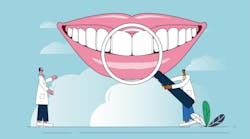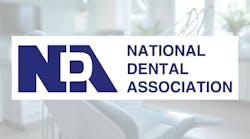Xlear CEO speaks out after dismissed lawsuit, defending xylitol research and questioning regulatory standards
In October 2021, the US Department of Justice and FTC announced that they were bringing an enforcement action against Xlear, a prominent manufacturer of xylitol oral and nasal hygiene products, for violations of the FTC Act and the COVID-19 Consumer Protection Act.
The DOJ claimed that Xlear and its CEO Nathan Jones “advertised that their saline nasal spray product could prevent or treat COVID-19, without competent or reliable scientific evidence to support those claims” and was “attempting to profit from the current public health emergency by unlawfully and deceptively advertising unproven products.”
The company claimed that the FTC's action was unfounded, and that its claims were supported by research, saying the goverment "was trying to stop Xlear from simply telling the public about the science."
The FTC action was big news in dentistry at the time, particularly as xylitol is used widely in dentistry as an antimicrobial, particularly S. mutans.
Xlear opted to take the case to court because, according to Nathan Jones, the company made no false claims and was simply trying to share published science with the American public.
Now, the Justice Department, with Xlear’s agreement, has asked the Federal Court to dismiss the lawsuit with prejudice, meaning the case can’t be refiled. In a press release, Jones said, “for going on four years, we have vigorously denied the FTC’s allegations— we steadfastly maintained that our statements about COVID were accurate and science-based. We provided the FTC scores of studies, both clinical and in vitro, that together demonstrated that the use of oral/nasal hygiene products, like Xlear nasal spray, helped to both prevent COVID infections when used by healthy people and reduce the duration and severity of sickness when used by those already infected with the virus.”
Recently, I sat down with Nate to hear his side of the story.
Why didn’t Xlear elect to settle with the government?
I would've much rather had a day in court. I believe that the reason why the DOJ and the FTC dismissed it is because they realized that they weren't going to win. Having a judgment against them for something like this would be bad for them.
If what we're saying is true, what the FTC did in 2020 and 2021 was they censored not only Xlear, but Neilmed, Navage, and all the other companies that are discussing nasal hygiene.
We were all sharing this data [about nasal hygiene]. Prior to 2020, the CDC had on its webpage that the way to treat a respiratory coronavirus infection was through nasal hygiene, flushing out your nose, flushing out your upper airway, so you're physically reducing the viral load, which would mean that the virus would have less of a chance of spreading to the rest of your body. If you're flushing it all out, you're not going to shed as much when you're out and about. All of that was on the CDC’s webpage prior to 2020.
In May of 2020, there was a paper that came out of Vanderbilt University where they took 60 patients over the age of 65. They all had comorbidities, all of them tested positive for COVID, and all of them had symptoms. They used saltwater [to wash the nose.] One hundred percent of them were better in under a week. You would think in May of 2020, they would've tried to share that data. But when Neilmed went to share it, when I went to share it, when Navage went to share it, we all received warning letters from the FTC telling us not to share that data.
We just happened to be the only one who said, “No, our country is in a disaster right now, and it’s getting worse. People have a right to know this.” It wasn’t even our product; it was just salt water.
It took some convincing from my lawyers that we should let the case go. I've already spent three and a half million dollars. I would much rather spend another million and a half and achieve something from it, because until the FTC changes its policy, then nothing changes.
Who at the FTC and the DOJ made the call to bring this action against Xlear, and what were their qualifications? What kind of review of the data was done?
Richard Cleland [was the official at the FTC who initiated the action], and he’s since left. I think a large part of why he left the FTC after 23 years was simply because he realized that this was a disaster, and he didn't want it coming back to him. And then you have another guy by the name of Keith Fenton Miller. But those are the two people that were really driving it. They're both lawyers. Neither one of them have any experience in science of any nature other than sending out warning letters and lawsuits.
Every single person that we deposed at the FTC acknowledged that they never even opened the studies. They didn't even look at the data that we sent them.
What was the impact of the lawsuit to your business, and how much did it cost?
In the beginning, it cost us a little bit of credibility—not a lot. We shared stuff with the media. The media wasn't picking up on it because we had a warning letter from the government telling us not to share the data, which if you ask me, that is absolutely bonkers. The media should be able to look at it and say, OK, this is a published study. This is in the medical literature, it's peer-reviewed. And better yet, it even makes sense.
If you're getting an infection in the nose, does it not make sense to wash your nose? But they wouldn't even talk to us. and they wouldn't even discuss the concept.
I live here in Utah, and we forwarded all this data to our state epidemiologist, our state surgeon general, and she simply responded: did the FDA approve it to treat COVID? We responded and said, it's not a drug. The FDA has approved it [for use in food] forever. It's here on the CDC’s webpage. And her response, wasn’t, well, hey, let me read a study. Let me think about it for a minute. Her response was, if the FDA isn't approving it for COVID, I'm not going to talk about it.
What kind of relationship have you had with the FTC in the past?
Twenty-five years ago, when I started this company, I put out some ads in medical journals that referenced a case study we’d done on preventing ear infections in children with xylitol. I got a paper letter from the FTC saying, “Hey, you need to call us. We need to talk what you're saying. You're making claims that are unreasonable.”
When I called, they said, “A case study doesn't fit the bill. You need a published, peer-reviewed study in order to make a claim. It didn't have to be a big randomized controlled trial. You just need sufficient science to actually back up the claim.”
We understood that. I said, “Hey, we have studies that are published in the British Medical Journal and in the Journal of Antimicrobial Chemotherapy explaining that xylitol blocks bacterial adhesion of S. pneumoniae, H. influenzae, and M. catarrhalis.” So, they said we could put that on our packaging, and it’s been there for 25 years.
But in 2020, there was a paper that came out of the University of Tennessee in Knoxville where they showed that xylitol—the same way it affects bacteria—was stopping SARS-CoV-2 from adhering to the tissue in the nose. And when we went and shared that data, the FTC said that goes too far.
The interesting part of that is they said, first of all, you can't use that study because they're using Vero kidney monkey tissue, which is the industry standard for the pharmaceutical industry. The FTC decided they wanted to hold us, a simple hygiene company, to a much higher standard. They said you can't make that claim until you do it on human airway tissue.
So, we did it with human airway tissue. We looked at RSV, H1N1, and SARS-CoV-2 of the Delta variety, which was the most pathogenic. We used different sugars, including erythritol, a four-carbon sugar, xylitol as a five carbon, and sorbitol as a six carbon.
Each of those sugar molecules affected the ability of each of those viruses to adhere, but at different levels. It wasn't across the board that everything blocks it. It's that they block it at different levels. We’ve learned a lot since then.
After that study was published and we put out a press release about it, the FTC called us again, saying we couldn’t do that. I asked them, and I said, this is published, why can't we say it? And the response was just absolutely beyond stupid: We can say that it blocks RSV. We could say that it blocks H1N1. We couldn’t say that it blocks SARS-CoV-2, even though this was all in same study, same paper, everything the same. And we said, “Why?” Their response: “Because we said so.”
And at that point, I just said, “You know what? I'm going to get back to work. Goodbye.” I hung up the phone and I told my attorneys to just ignore them until they sue us. Because that is ridiculous to the point that they're just saying, well, because we told you so. That isn't regulation. That's personal vendettas.
This lawsuit was published in October 2021. Have you done any additional research since then?
There isn't any that we have done simply because the government's going to ban us from sharing it. What's the point of doing it? I mean, let's figure out what they're going to allow us to say before we go out and spend the money to do it.
But there have been a number of papers that have come out. There was a paper that was just published in the British Medical Journal where they actually showed that whatever respiratory illness you have, if you just rinse out your nose, it reduces [the pathogens]. It reduces the need for antibiotics.
The market for nonpharmaceutical health products, what we often call “natural” products, is only growing, including in dentistry. What do you think manufacturers of these kinds of products should learn from Xlear’s experience?
I published an open letter to the natural products industry on this topic. I pointed out that one of the things that they absolutely should do is have a document retention policy so that if they don't need to keep an email, it auto-deletes after 30 days.
The vast majority of the money this lawsuit cost me wasn't paid to the government. It was paid to my own attorneys. They have to go read through every single email, and you're talking hundreds and hundreds and hundreds of thousands of them over the last five years, every single email. When the government comes in, their intent is to make it expensive.
You're paying these guys a thousand bucks an hour to sit there and read through emails, and that's where the expense is. And if we had had a document retention policy that said after 30 days it deletes your email unless you move it into a save file, it probably would've been a third of that.
I would say make sure that you're following the rules and regulations, but we were a hundred percent following the rules and regulations. They sued us saying that we didn't have substantial science, and they said you don't have two RCT studies. That wasn't what the standard was. They hadn't even said that to the public. That actually came out in December of 2022. Fourteen months after they sued us, they changed their rules so that they could go and use that retroactively.
I don't think that would've stood up in a court, which again is one of the reasons there was so much stuff that was just wrong in this case that that's why they dismissed it.
What's next for Xlear? Are you planning any new products or new research?
We're doing some ongoing research that we did not intend to publish with any attachment to Xlear. We've actually been funding a lot of research looking at non-hexose (non six-carbon sugars), and how they affect cancer. We know Strep mutans (as in “mutant”) doesn’t metabolize six-carbon sugar as fully as other bacteria, and that’s why we get the acid that dissolves our enamel.
Cancer is also a tissue that is mutated and hyper-consumes sugar. We wondered, would xylitol affect the cancer?
There were a couple of quick studies at Northwestern that induced cancer in humanized mice, and then xylitol was injected into the tumor. Within a couple of days, the tumors were starting to collapse, but then growth of the tumor just exploded and killed the rats. That didn’t work, so the researchers went back and retried the experiment with tiny micro-osmotic pumps that trickled xylitol into the tumor, and the tumors just continued to shrink and shrink and shrink and went away.
There are other studies that we're doing right now that will be coming out soon. We’re looking at ingredients other than fluoride that actually remineralize the enamel. Love or hate fluoride, the trend is that we’re moving away from it, and I think that that trend is going to continue as more and more data is coming out about the ineffectiveness of fluoride and the dangers of it.
There are other ingredients that you can use that actually do better than fluoride. You can use calcium trimetaphosphate or sodium trimetaphosphate, which will remineralize your enamel about 36% stronger than what fluoride does. It also remineralizes it deeper into the enamel.
What do you see happening with dentistry and oral health in the next few years?
Now we’re all familiar with Kennedy and this MAHA movement to “make America healthy again.” If he does not get the dentist and the hygienist on board, I think he will fail. If you look at almost all of the chronic illnesses that he is saying he's going to solve, you can trace it back to bad oral hygiene. He's also got to get sugar out of the diet.
But broadly speaking, we as Americans have a chronic illness, which is tooth decay, and that chronic illness is making all these other illnesses worse. If he doesn't address it in the mouth, he's going to fail. I'm trying to get the data in front of him so that he understands that.
About the Author
Amelia Williamson DeStefano
Group Editorial Director
Amelia Williamson DeStefano, MA, is group editorial director of the Endeavor Business Media Dental Group, where she leads the publication of high-quality content that empowers oral-health professionals to advance patient well-being, succeed in business, and cultivate professional joy and fulfillment. She holds a master's in English Literature from the University of Tulsa and has worked in dental media since 2015.
Updated May 16, 2023



